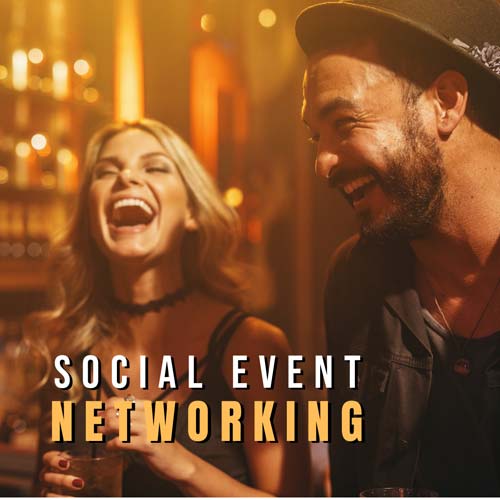Hutson & Houck
Meeting a potential business contact at a social gathering can be a bit complicated. Obviously we all know it’s not the appropriate time to give your elevator pitch and set up a follow up during Aunt Becky’s funeral or cousin Sarah’s wedding. The key is knowing how to take advantage of the opportunities at your kiddo’s soccer game without coming across as pushy or out of line.
Consider some of these tips when networking at social events.
Be Helpful, Be Memorable:
- Share information. Maybe you’ll find a natural opening for discussing trends in your industry or demonstrating your expertise. Maybe you’ll accomplish more by explaining sharing your knowledge of local cuisine or discussing a great new series you’re binge watching.
- Offer referrals. Personal testimonials are more reliable and carry heavier weight than online reviews. You don’t always have to be talking about yourself and your business. Spread the word about businesses and services you like and build a pattern of credibility at the same time.
- Be a joiner. Don’t be afraid to pitch in. Contact the host or planning committee in advance to see how you can help. Helping out can be a great way to make mingling easier at parties or events. Your contributions will be remembered to more than just the hosts.
- Pay attention. Simple gestures can go a long way. You will make a positive impression simply by listening closely to what other guests are saying. Focus on their message and ask relevant questions to make yourself memorable.
- Be enthusiastic. We are naturally more attracted to people when they’re smiling or having fun. Check your body language, are you giving off a warm and friendly vibe? Use eye contact to let others know that you welcome conversation and want to know more about them.
Follow Up:
- Ask your friends. If you and someone you just met have contacts in common, you may be able to rely on them to help you stay in touch. That could even include children and pets if they go to the same schools and dog parks.
- Common Ground. Initial conversations may have opened doors to areas of mutual interests. Explore some of those, and follow up. Networking isn’t about getting what you can from someone and moving on. Even business relationships need to be built on a solid foundation, this is most successful when you have regular interactions outside of business all day all the time.
- Do your research. Don’t be afraid to go online. Be respectful and keep privacy in mind, but doing your research can be constructive and provide valuable information. Learn more about your business relationships from public sources like their company website or news articles.
- Get the Deets. Recognize that every situation is not appropriate to hand out business cards. Assess the situation, take note of what the situation calls for. Your new contact may be more receptive if you offer your phone number/email or suggest a casual coffee meetup.
Other Tips for Networking at Social Events:
- Practice regularly. Networking skills can be developed. Chatting with other parents at the park is a low-risk way to train for more challenging professional communications.
- Focus on quality. Networking is usually more rewarding when you concentrate on who you’re talking with now instead of trying to work the whole room. A small number of mutually supportive relationships is more valuable than having a lot of superficial contacts.
- Circulate more. It will be easier to allow relationships to develop gradually and naturally if you feel like you have an abundance of opportunities. Experiment with accepting more invitations and hosting your own gatherings. See what a difference it can make in widening your circle.
- Respect boundaries. Be sensitive to the purpose of any event and the comfort level of others. Honoring their needs will help you to make a positive impression.
Strengthen your network by learning how to use social events to build relationships. You’ll be helping yourself and others as long as you take a genuine and generous approach.
